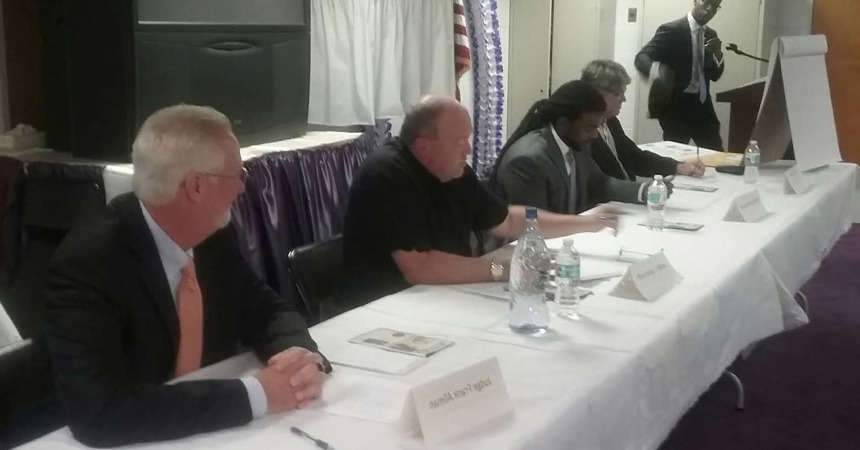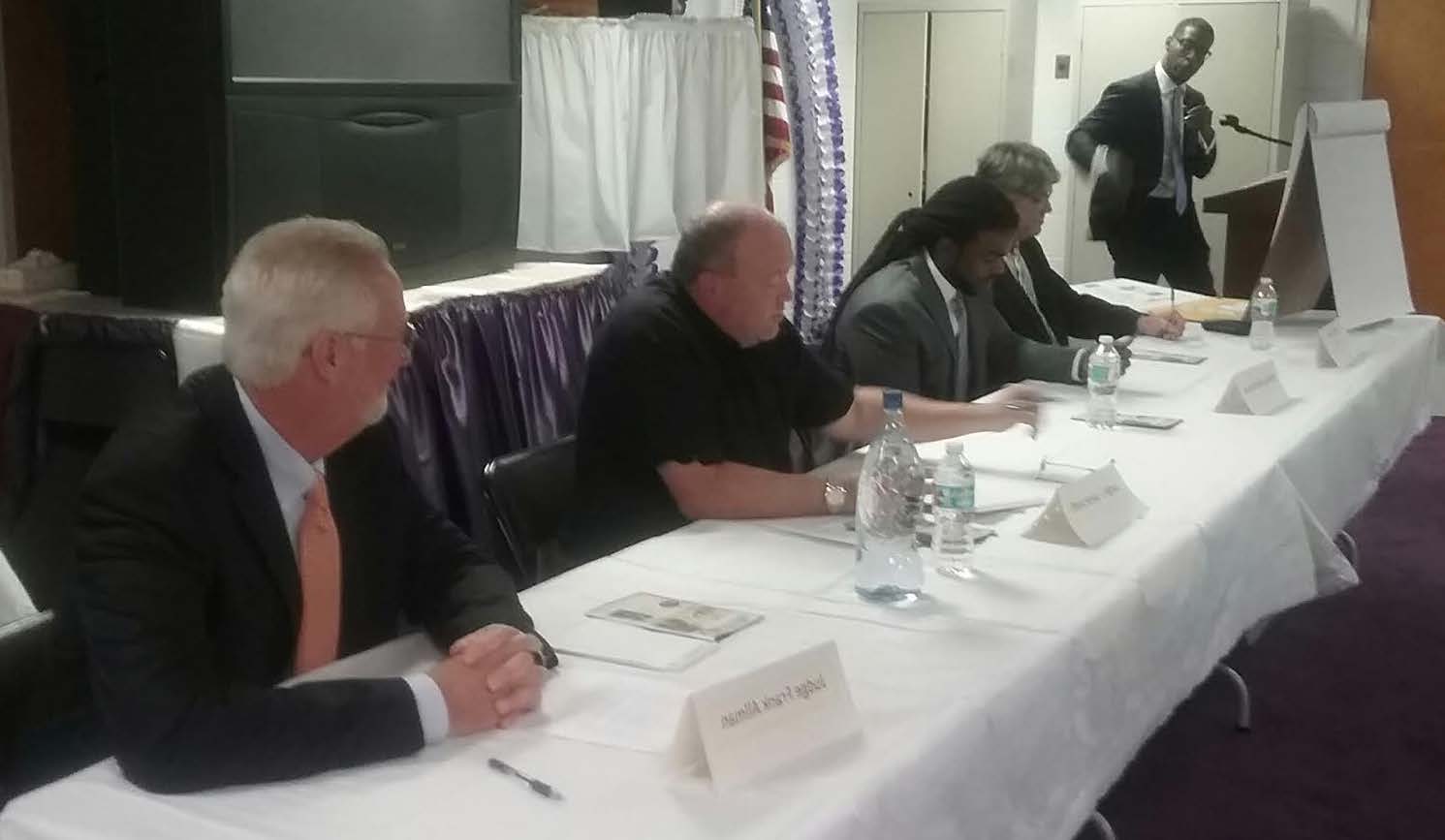
Symposium panelists say criminal justice reform needed

Judges J. Layne Smith (second from right) and Frank Allman (right) had candid views on laws governing the criminal system. Photo by St. Clair Murraine
By St. Clair Murraine
Outlook staff writer
Panelists who participated in a symposium on the criminal justice system last weekend agreed that reform is needed in several of the state’s laws on crime, with most of them saying that community engagement is the way to get lawmakers to take the initiative.
“Hold your elected officials accountable,” said Judge J. Layne Smith. “You need to call us out. That would be if you thought anything was implicitly bias because as much as I or anybody else want to think that we are not bias, we all know that we are flawed.”
Moderators, attorneys Mutaqee Akbar and Jami Coleman, guided the conversation on an array of issues that included mental illness, mandatory sentencing and pretension stops by law enforcement officers. Orlando senator Randolph Bracy, who is the first Black to head up the senate criminal justice committee, also presented some perspective on the law-makers’ view.
They also addressed Florida’s controversial stand your ground law, which was the focal point of George Zimmerman’s trial for the shooting death of Trayvon Martin in 2012.
The three-hour discussion that was hosted by Bethel Missionary Baptist Church on Saturday featured panels that were split for three sessions, representing prosecution, defense and legislative. Prominent judges Barbara Hobbs, Frank Allman and Smith participated on two of the panels.
Coleman said the conversation was a good starting point to bring awareness to the struggles on both sides of the criminal justice argument.
“I want us to keep the conversation going,” she said. “I want people to hold us accountable and I want us to take these initiatives back to our representatives and see if we could effectuate change that way.
For the most part, the conversation was candid – whether it was a member of the panel or an ex-felon in the audience.
“I think it was refreshing,” Coleman said. “At the national level we hear a totally different conversation and it’s dark and gloomy. (But) I think what we heard today was not only very, very honest and intimate conversation but we heard a promising perspective on our future.”
Pretension stops was one of the talking points. The discussion became intense quickly after Akbar opened up with the question of why police tend to make a traffic stop that usually leads to an arrest if the vehicle driver is in the poorer areas.
Both attorney Matt Williams and public defender Andy Thomas said they’ve defended clients who were involved in a pretension stop, then charged with a crime unrelated to the reason they were stopped.
Williams questioned whether some of the stops aren’t racially motivated. He made his point by giving details of statements he read in a police report of an incident involving one of his clients.
“I was doing traffic patrol on Orange Avenue when I noticed a Black male with no shirt on drive by me,” Williams said the report stated.
“That mentality is the problem,” he said. “When you look at somebody and say you’re doing something wrong; I’m going to stop you.”
Thomas suspects that law enforcement uses the pretension search tactic primarily to search someone’s vehicle. Judge Smith said that there might be some gray area of the law with the tactic, suggesting that defense attorneys need to be more aggressive in defending their clients in those cases.
“I think it’s absolutely disingenuous,” Thomas said. “I think it’s not scrupulous to do law enforcement like this. They send in not traffic enforcement; they send in narcotics agents to the south side of Tallahassee where they receive citizen complaints.
“I said well, doesn’t anybody in Killearn complain, doesn’t anybody in Betton complain. I mean, why are we doing it only in the poor side of town.”
When the conversation switched to concerns about prosecuting someone who might have a mental illness, both Sheriff McNeil and state attorney Jack Campbell said their agencies are sorting through the perplexing issue.
McNeil said arrest of mentally ill individuals could be reduced if calls involving such persons are handled differently. He said the outcome could be different if mental health personnel are called first, with law enforcement as a backup.
Several people in the packed room had plenty of suggestions for the panels during Q&A. Ex-felon Kelvin Johnson seemed to be making a desperate plea when he asked for an investigation of living conditions in prisons. He admitted to spending most of his 61 years locked up and found the conditions inhumane.
“One thing they don’t teach you in prison is brotherhood,” he said. “They hate each other and fight each other.
“I did my time. I’m tired of doing prison time.”
Campbell said he is aware of the fate of prisoners who are living in the conditions that Johnson spoke about. The situation is one that has to be fixed so prisons could serve for what it’s intended, Campbell said.
“We have to recognize that people go to prison as punishment, not for punishment,” he said. “We need to recognize that just putting them in a cage and letting them out is not going to change their behavior. You have to give them the life-training; you have to give them a pathway so that they’re not disenfranchised. When they lose hope (and) the desire to get better, all they do is come back into the community and the violence escalates.”
At one point during the conversation, FAMU sociology professor Keith Parker shared a hand-out that outlined the cost of incarceration. More of the billions of dollars spent on prisons should go to resources keeping people with non-criminal issues out of prisons, he said.
But he warned that there are no quick fixes.
“If we think transforming or reforming the system is going to come from within the system we are not being very prudent or smart,” Parker said. “Change is going to have to come from us who are involved in the community; those of us who become activists, those who become very concerned about the behavior of Pookie and Baebae; we just have to do a whole host of things to get involved.”
Akbar and Coleman kept notes throughout the discussion. Ideas that came out of the symposium will be shared with lawmakers, they said.
“This is the start of a real conversation,” Akbar said. “We’ve addressed the problems, we are leading to the solutions and hopefully we can take this to our legislators to do what they can, and also to our communities so that we can advocate.
“We are in a unique time right now because criminal justice reform is a bi-partisan issue.”







